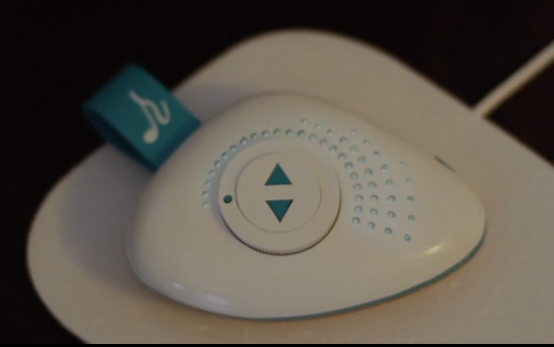Alzheimer’s Disease Treatment Taps Into The Power of Music To Help Patients Restore Lost Memories [VIDEO]

We all know that music is good for the heart and soul, but how about the brain? A team of innovative young design students have developed an MP3 player that uses music to help Alzheimer’s patients recover lost memories, using specific songs to recall places, events, and even people.
The device, named ReMind, was inspired by a short film Alive Inside which depicted an otherwise catatonic 90-year-old patient coming to life after listening to his favorite music. Touched by the film, which went viral last year, four students, Miglė Padegimaitė, Lina Trulsson, Darja Wendel, and Emily Keller, devised a way to help others benefit from music’s healing properties.
"Since music is strongly linked to emotion, our brains connect music with long-term memory, as long as it’s personal, familiar music," Emily Keller, one of the designers involved in the project told Fast Coexist. "I think there’s a lot of potential to use these melodies and lyrics ingrained deep in the brain to trigger memories."
The concept behind the idea is simple and works on a known phenomenon: songs can help to bring up a special memory. Using the app, family members can help to choose a song that may remind a person suffering from Alzheimer's of a person or event. "The song would be from a memory they shared, for instance a wedding song for spouses, a favorite concert jam between friends, or a loved lullaby for grandchildren," Keller explained. "They might have trouble recalling details and names but a song has the ability to bring back memories of when it was first heard, as long as it played a significant role in the event."
The families would be able to program which sounds would play and when, for example calming songs could be programmed to play at night to help lull patients to sleep.
"I would be happy to see it brought to life, and would love to refine the concept further by involving nursing home workers, Alzheimer’s patients and their families," said Keller.
Music has been recognized for its therapeutic purposes since the times of Aristotle and Plato, but according to CNN was first formally used in Western medicine in the 20th century on veterans of the two World Wars. Working along similar lines as the ReMind project, therapists today often use music in elderly care settings to evoke a positive emotional response. The therapy is also sometimes used on children with special needs or on individuals with conditions such as Post-Traumatic-Stress-Disorder.
Scientists have also observed that music can bring about physical changes to the brain, causing you to feel calmer. In one 2013 study, conducted by researcher from McGill University in Canada, it was observed that individuals who listened to music had less anxiety and lower cortisol than people who took anxiety-relieving drugs.
"The promise here is that music is arguably less expensive than drugs, and it's easier on the body and it doesn't have side effects," Dr. Daniel Levitin, a researcher on the project, told CNN.
Update: The names of Miglė Padegimaitė, Lina Trulsson, Darja Wendel, co-designers of the ReMind device, have been added to the story.
Published by Medicaldaily.com



























